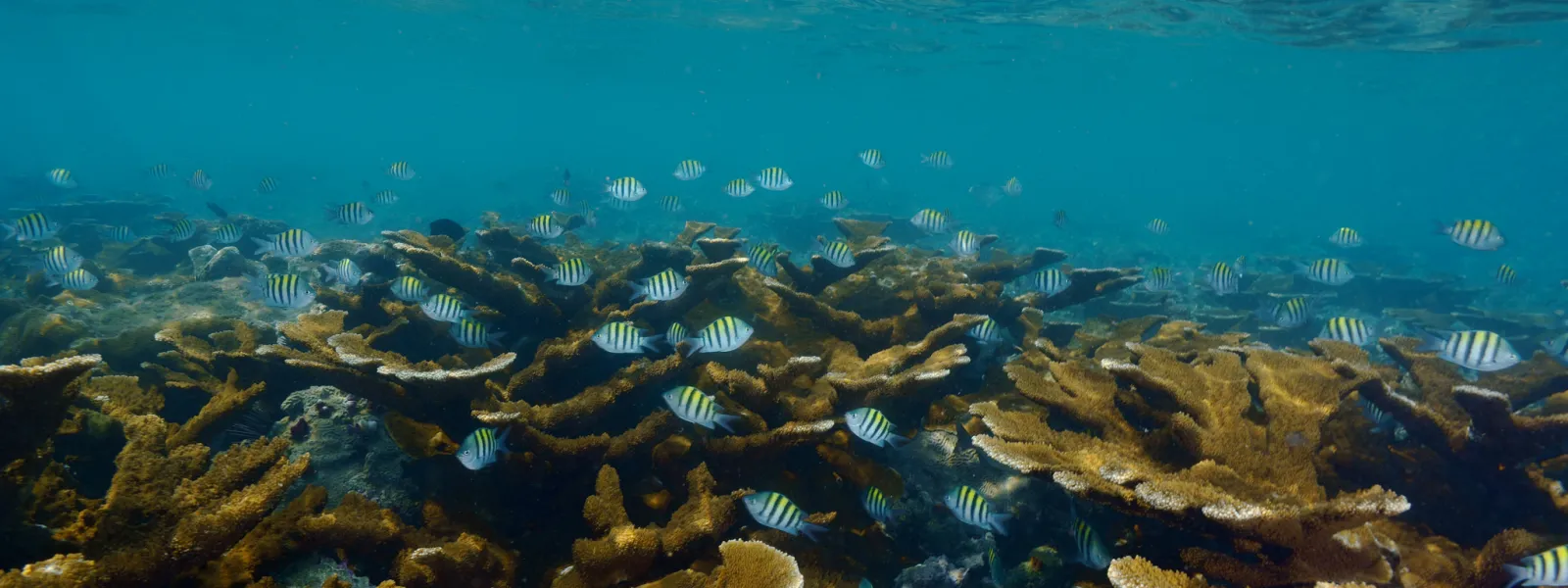
Project
Photo: Manuel VictoriaDefending the Veracruz Reef from a port expansion project
In the Gulf of Mexico, 27 coral reefs form a submarine mountain range running for miles between six islands. Hundreds of colorful fish species, sea urchins, starfish, and sea grasses share the reef with an abundance of other life forms. Fishing, sport diving, and beach tourism thrive along the coast. This is the magnificent Veracruz Reef, the largest coral ecosystem in the Gulf.
In 1992, Mexico’s government declared the Veracruz Reef System a Natural Protected Area. In 2004, it was listed as a Wetland of International Importance under the Ramsar Convention, a treaty for the protection of wetlands including reefs.
Despite the reef’s recognized significance, in 2013 the government reduced the size of the Natural Protected Area and approved a port expansion project. Local communities and organizations challenged the project's environmental permits, demanding protection of the right to a healthy environment.
On February 9, 2022, the Supreme Court of Justice of the Nation unanimously decided that the authorities violated the right to a healthy environment of Veracruz residents by authorizing the port expansion based on a fragmented environmental impact assessment. This means that the permits for the project are non-existent and that the impacts of the project on the health of the reefs must be studied again, this time in a comprehensive manner, and even the viability of the project.
The ruling is a historic precedent not only in Mexico, but for the entire region, as it allows access to environmental justice for the people neighboring an ecosystem affected by a project.
Partners:
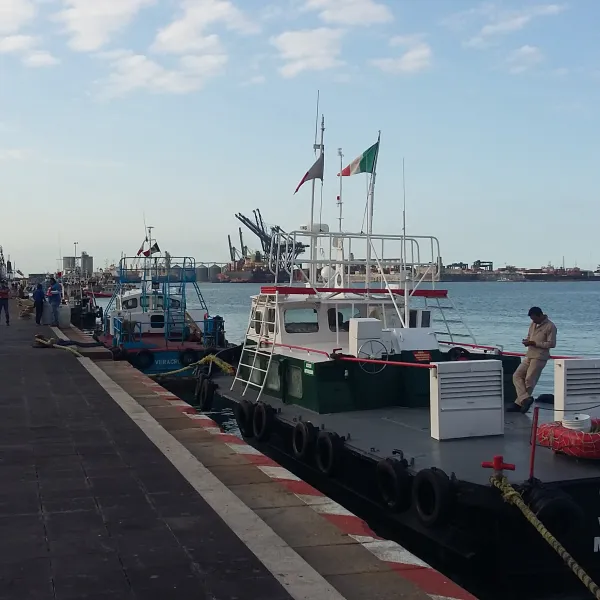
Related projects
Latest News
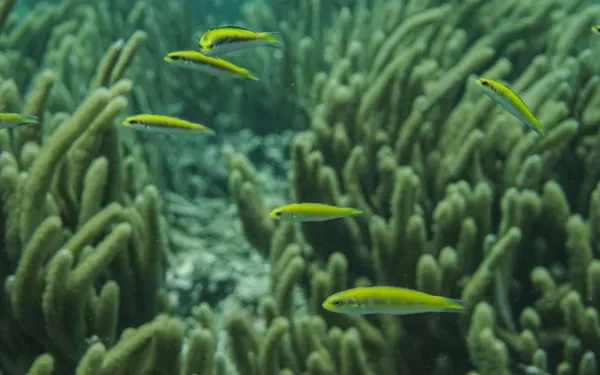
Mexican Supreme Court order to protect the Veracruz reef still unenforced
A port expansion project threatens the reef that hosts the greatest biodiversity of reef species in the western Gulf of Mexico. More than two years after the Supreme Court of Mexico ordered the adoption of several measures to protect the Veracruz Reef System and surrounding ecosystems affected by a port expansion project, the Ministry of Environment and Natural Resources (Semarnat) still refuses to comply with the ruling, putting the largest reef in the Gulf of Mexico and its environmental benefits at risk. The environmental organizations Territorios Diversos para la Vida, A.C. (TerraVida), Mexican Center for Environmental Law (CEMDA), Interamerican Association for Environmental Defense (AIDA) and Earthjustice denounce this failure to comply with the court order. The Veracruz Reef System—a Wetland of International Importance under the Ramsar Convention since 2004—hosts the greatest biodiversity of reef species in the western Gulf of Mexico and is home to several critically endangered species such as the hawksbill sea turtle. The reefs are of high importance to the Veracruz community because they protect the coast from hurricanes and support local fishing and tourism. On February 9, 2022, residents of Veracruz won a victory before the Supreme Court in an amparo action filed to defend the Veracruz reef and other relevant ecosystems from the impacts of the port expansion. The highest court in Mexico determined that Semarnat violated the people of Veracruz’s right to a healthy environment after finding the project’s approval to be severely deficient. As a result, the Court ordered the revocation of the project’s permits, as well as a complete and holistic reevaluation of the project’s impacts, tasks that Semarnat has not yet complied with. "Today, the right to a healthy environment of the people living in the Veracruz-Boca del Río-Medellín metropolitan area continues to be violated because Semarnat, when re-evaluating the port expansion’s environmental impact after the court order, used outdated scientific information, failed to conduct a new evaluation, and allowed the port to again fragment its project by separating out the rock quarries and breakwaters," said Francisco Xavier Martínez Esponda, co-coordinator of TerraVida, the organization representing the plaintiffs in the lawsuit. "In short, the project was never evaluated in a complete and holistic manner, as ordered by the Court, and therefore we remain unaware of the project’s true environmental risk." The environmental authority had authorized the project in a fragmented manner, dividing it into 15 sections, which it evaluated and approved independently, obscuring its full impact. Far from complying with the court’s order, on December 30, 2022, Semarnat's General Directorate of Environmental Impact and Risk conditionally reauthorized the Veracruz port’s expansion, but once again in a fragmented manner, without adequately assessing the full project using the best available science and without allowing for public participation, as the court required. In its decision, Mexico’s highest court also ruled that Semarnat was obligated, among other things, to seek international technical assistance to preserve the site within the framework of the Ramsar Convention, an intergovernmental treaty for the protection and sustainable use of wetlands and coastal areas. To date, Semarnat has not yet finalized its request for international support. "In the absence of adequate and meaningful government efforts, there is a clear delay in obtaining expert advice from the Ramsar Convention," said Jorge Lu Palencia, an attorney with AIDA. "It is paradoxical that the expansion of the port has been authorized while still awaiting an independent technical evaluation, which, by its nature, should be prior to any decision that puts the ecosystem at risk." In addition, a scientific analysis prepared by independent researchers concluded that the mitigation measures proposed by the project promoter—the Veracruz Port System Administration—are not capable of avoiding the adverse consequences on the Veracruz reef because they were not based on a scientifically valid assessment of the project’s impacts. The scientific analysis shows that the environmental agency has not studied the potential impacts on the entirety of the reefs within the Veracruz Reef System National Park. In addition, dredging activities were carried out without considering the direct impact on the invertebrate species that inhabit the marine sediments. In view of the situation, the analysis recommends an external evaluation provided by a public research center. For these reasons, the organizations, at different times, have requested the Fifth District Court in Veracruz—in charge of supervising compliance with the judgment—to withhold from ruling on compliance with the judgment until these deficiencies are corrected. Press contacts Gabriela Sánchez, TerraVida, [email protected], +52 5511429935 Víctor Quintanilla (Mexico), AIDA, [email protected], +521 5570522107
Read more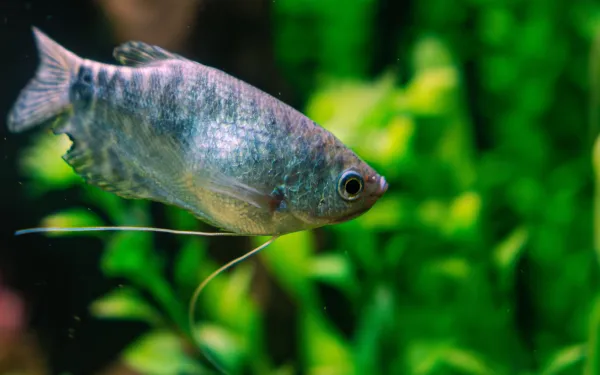
Mexican environmental authority violates Mexico’s highest court and international obligations when reissuing a permit for a port expansion that threatens the Veracruz Reef System
In a legal brief, AIDA and Earthjustice argue the Secretary of the Environment failed to properly evaluate the environmental impact of the project to the reef, a UNESCO World Heritage Site, as required by Mexico’s highest court. Mexico City, Mexico – Today, AIDA (Interamerican Association for Environmental Defense) and Earthjustice filed a brief with the Fifth District Court of Veracruz to help protect the Veracruz Reef System from the Veracruz port expansion project. When reauthorizing the project, the Secretary of the Environment and Natural Resources (Semarnat) not only failed to comply with a ruling of the Supreme Court of Justice of the Nation, but also ignored Mexico’s international obligations regarding environmental protection and human rights, including the human right to a healthy environment guaranteed in the Mexican Constitution. This was demonstrated by AIDA and Earthjustice in a legal brief (Amicus Curiae or "Friend of the Court") filed before the Fifth District Court of Veracruz. In it they request that the court -- which is in charge of determining whether the Supreme Court’s ruling was complied with or not -- establish contempt and force Semarnat to re-examine the project based on the environmental impact assessment procedure required by the high court. "The authorities must comply with the Supreme Court ruling and protect this internationally-recognized natural treasure of Mexico. The human right to a healthy environment cannot be ignored," said Guillermo Zúñiga, a Veracruz native and Earthjustice attorney. "The reef not only hosts the greatest biodiversity of species in the central region of the Gulf of Mexico, but also helps mitigate the impact of storm surges and hurricanes. The people who grew up here, as I did, and who live here now, know the value of this sanctuary where land and sea harmonize in unity." On February 9, 2022, residents of Veracruz won a victory before the Supreme Court in an amparo action filed to defend the Veracruz Reef System -- the largest reef in the Gulf of Mexico -- and its environmental services against the Veracruz port expansion project. The Supreme Court ordered the revocation of the permits by determining that Semarnat, by approving the project, violated the right to a healthy environment of the people of Veracruz. Despite the ecological, cultural, and economic importance of the Veracruz Reef System, the environmental authority had authorized the port expansion in a fragmented way, dividing the project into 15 permits and diluting its true impact. In addition, it completely excluded from its analysis a non-emerging reef ("La Loma") located in the area of the Veracruz Reef System National Park. In its ruling, the Supreme Court ordered the environmental authority to reevaluate the project in an integral, holistic and complete manner. In addition, it ordered that the new evaluation be made in accordance with the elements that make up the right to a healthy environment, as well as the principles of prevention and precaution, enshrined in international law. It also requested the support of the National Council of Natural Protected Areas and the International Wetlands Committee of the Ramsar Convention to design a protection scheme for the Veracruz Reef System. "Right now, the court has the opportunity to confirm the transformative effect of the Supreme Court's ruling and set a valuable precedent for the real protection, not just on paper, of Veracruz's reefs and the universal right to a healthy environment," said Sandra Moguel, an attorney with AIDA's Ecosystems Program. "Including the international authorities of the Ramsar Convention would mean strengthening the project's environmental impact assessment with technical knowledge and transparency." As demonstrated in the brief, by granting a second permit to the project -- on December 30, 2022 -- Semarnat failed to comply with the Court's ruling and the Mexican State's obligations because: It did not require a new environmental impact study -- mandatory for projects of this size under international law and national legislation -- to analyze the cumulative impacts of all segments of the original project. On the contrary, the environmental authority based its assessment on the original deficient statements. Even so, it left three of the original segments out of its analysis. It failed to submit its new assessment to a public consultation nor did publish new information on the impacts of the project before authorizing it again. In this way, it ignored the rights of the people of Veracruz to public participation and access to information in environmental decision-making. Semarnat has not yet requested the support of the National Council of Natural Protected Areas or the International Wetlands Committee. The participation of this committee is of particular importance due to its experience and technical knowledge in the protection of protected areas and wetlands. The Veracruz Reef System is a Natural Protected Area designated under national legislation, a wetland of international importance under the international Ramsar Convention, and a UNESCO World Heritage Site. AIDA is an international non-profit organization that has been protecting the human right to a healthy environment in the Americas for 25 years. Earthjustice is the premier nonprofit public interest environmental law organization in the United States. We wield the power of law and the strength of partnership to protect people's health, to preserve magnificent places and wildlife, to advance clean energy, and to combat climate change. press contacts Sandra Moguel, AIDA, [email protected] (Spanish and English) Kathryn McGrath, Earthjustice, [email protected] (English) Guillermo Zúñiga, Earthjustice, [email protected] (Spanish)
Read more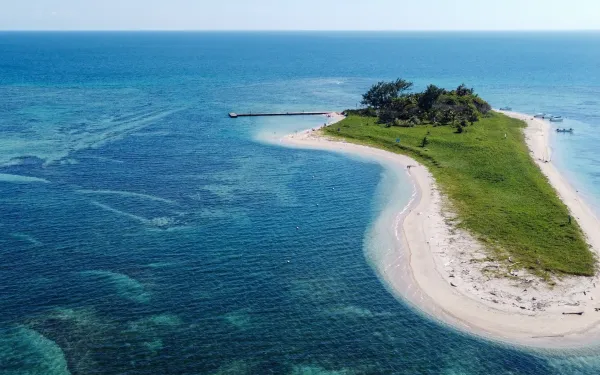
Reaffirming the legitimate protection of the right to a healthy environment
In December 2016, two women from Veracruz decided to defend the Veracruz Reef System in court. They sought to protect the largest coral ecosystem in the Gulf of Mexico from the expansion of the port of Veracruz, which would cause serious and irreversible impacts on the reef’s biodiversity and, by extension, the local population. Residents of the Veracruz metropolitan area, represented by the Centro Mexicano de Derecho Ambiental (CEMDA), filed an injunction against the project because its environmental permit resulted from a fragmented impact assessment that did not consider the full range of risks to the reefs. AIDA supported our partners at CEMDA by filing an amicus brief with detailed information on the important services the reefs provide: sequestering carbon, generating oxygen, producing food, and protecting coastal areas from storms and hurricanes, among others. In April 2017, the court that heard the case rejected the injunction and, with it, the request to suspend work on the port expansion. The court argued that the plaintiffs failed to demonstrate that the project had "a real and relevant impact" on their rights and that they lacked a "legitimate interest" in the case. Legitimate interest—also known as legal standing—refers to a person’s capacity to claim damages before a court of law, in any scope. In a traffic accident, for example, only you have the legitimate interest to claim the damages your vehicle may have suffered, which must be individual and quantifiable. However, in matters of environmental damage, the situation is more complex. The degradation of an ecosystem affects more than one person and even transcends generations. The residents of Veracruz appealed the judicial setback and their case arrived before Mexico’s highest court, the Supreme Court of Justice of the Nation. Given the lower court’s limitations in recognizing in its ruling the right of all people to equal access to justice in environmental matters, AIDA and Earthjustice filed a second legal brief before the Supreme Court, requesting an expansion of the requirements for legitimate interest. We provided legal and technical evidence regarding the human right to a healthy environment and access to justice, enshrined in international law. These rights mean that the Mexican government must ensure that anyone whose fundamental rights are threatened by environmental degradation has the possibility of achieving justice, regardless of whether their connection to the threatened ecosystem is indirect or remote. The Environmental Law Alliance Worldwide also contributed a brief that analyzes court decisions from various jurisdictions recognizing the right of any person, civil society organization, or local resident to file lawsuits against projects and decisions that may negatively affect the environment. Finally, on February 9, 2022, more than five years after the original lawsuit was filed, the residents of Veracruz won an important victory for the area’s reefs. In a unanimous decision, the Supreme Court found that government authorities violated the right to a healthy environment of the people of Veracruz by authorizing the port’s expansion. Since it was unopposed, the ruling creates a binding precedent for all courts of the nation. The Veracruz decision is a landmark ruling, valuable for not just Mexico but for the entire region because it: Ratifies that proximity to a project does not define who the affected people are or who can claim protection of their right to a healthy environment before the courts. Reaffirms that it is not necessary to prove quantifiable and individualized damage in order to have access to environmental justice; it is sufficient to demonstrate that a project or activity, by degrading an ecosystem, damages or threatens to cause damage (economic, social, cultural, health, etc.) to a community. Recognizes an expanded legitimate interest, as well as the collective nature of the right to a healthy environment and public participation in environmental assessment processes. Sets a precedent with the capacity to transform the way in which environmental impact assessments are carried out in Mexico, incorporating the principles of prevention and precaution. Points to Mexico's international obligations, including those acquired under the Regional Agreement on Access to Information, Public Participation and Access to Justice in Environmental Matters in Latin America and the Caribbean (Escazú Agreement). As an organization and individuals, we are celebrating this important step toward strengthening the defense of the right to a healthy environment in the region. We are proud to have contributed to this achievement, and hopeful that the implementation of the ruling will be carried out according to the highest standards.
Read more